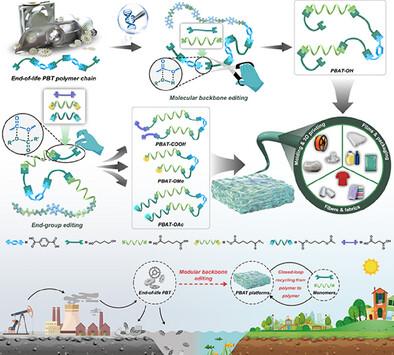当前位置:
X-MOL 学术
›
Adv. Mater.
›
论文详情
Our official English website, www.x-mol.net, welcomes your
feedback! (Note: you will need to create a separate account there.)
Modular Molecular Editing of End-of-Life PBT for High-Performance Sustainable and 3D-Printable Platforms
Advanced Materials ( IF 27.4 ) Pub Date : 2025-06-04 , DOI: 10.1002/adma.202503881
Huilin Xie, Guang Xiao, Geng Ren, Guodong Lu, Wu Chen, Huimei Zhang, Jialei Li, Wenjie Luo, Hongjie Zhang, Weipu Zhu, Qiuquan Cai
Advanced Materials ( IF 27.4 ) Pub Date : 2025-06-04 , DOI: 10.1002/adma.202503881
Huilin Xie, Guang Xiao, Geng Ren, Guodong Lu, Wu Chen, Huimei Zhang, Jialei Li, Wenjie Luo, Hongjie Zhang, Weipu Zhu, Qiuquan Cai

|
Engineering polyesters, particularly poly(butylene terephthalate) (PBT), are widely used but generate significant waste, with limited recycling options. Existing mechanical and chemical recycling strategies struggle to sustainably and efficiently reuse PBT, resulting in product performance degradation and making the recycling process more costly than the upstream synthesis routes for raw materials. Inspired by DNA editing technologies in molecular biology, a modular molecular editing strategy is proposed to sequentially modify the backbone and end groups of end-of-life PBT, transforming it into a high-performance, sustainable, and 3D-printable poly(butylene adipate-co-terephthalate) (PBAT) platform. Unlike traditional commercial PBATs that produce only single components, this platform surpasses them in tensile strength and toughness without requiring additional additives and features programmable properties for diverse applications, including injection-molded parts, 3D-printed components, films, packaging, fibers, and fabrics. The industrial scalability of this strategy is validated through successful 100-L pilot-scale production. The resulting PBAT allows closed-loop polymer-to-polymer recycling by reintroducing PBT or monomers, thereby enhancing its social sustainability. When recovery is no longer feasible, the materials remain ecologically sustainable through composting, avoiding harmful environmental accumulation. This work achieves a direct polymer-to-polymer conversion of end-of-life PBT into high-performance materials, with techno-economic analysis highlighting both environmental and economic advantages.
中文翻译:

报废 PBT 的模块化分子编辑,用于高性能、可持续和 3D 打印平台
工程聚酯,尤其是聚对苯二甲酸丁二醇酯 (PBT),应用广泛,但会产生大量废物,回收选择有限。现有的机械和化学回收策略难以可持续和有效地再利用 PBT,导致产品性能下降,并使回收过程比原材料的上游合成路线成本更高。受分子生物学中 DNA 编辑技术的启发,提出了一种模块化分子编辑策略,以依次修饰报废 PBT 的主链和末端基团,将其转变为高性能、可持续且可 3D 打印的聚己二酸丁二醇酯- 对苯二甲酸丁二醇酯 (PBAT) 平台。与仅生产单个组件的传统商用 PBAT 不同,该平台在拉伸强度和韧性方面超越了它们,而无需额外的添加剂,并且具有适用于各种应用的可编程特性,包括注塑成型部件、3D 打印组件、薄膜、包装、纤维和织物。该策略的工业可扩展性通过成功的 100 L 中试规模生产得到验证。由此产生的 PBAT 通过重新引入 PBT 或单体来实现闭环聚合物到聚合物的回收,从而提高其社会可持续性。当回收不再可行时,这些材料通过堆肥保持生态可持续性,避免有害的环境积累。这项工作实现了将报废 PBT 直接从聚合物到聚合物转化为高性能材料,技术经济分析突出了环境和经济优势。
更新日期:2025-06-04
中文翻译:

报废 PBT 的模块化分子编辑,用于高性能、可持续和 3D 打印平台
工程聚酯,尤其是聚对苯二甲酸丁二醇酯 (PBT),应用广泛,但会产生大量废物,回收选择有限。现有的机械和化学回收策略难以可持续和有效地再利用 PBT,导致产品性能下降,并使回收过程比原材料的上游合成路线成本更高。受分子生物学中 DNA 编辑技术的启发,提出了一种模块化分子编辑策略,以依次修饰报废 PBT 的主链和末端基团,将其转变为高性能、可持续且可 3D 打印的聚己二酸丁二醇酯- 对苯二甲酸丁二醇酯 (PBAT) 平台。与仅生产单个组件的传统商用 PBAT 不同,该平台在拉伸强度和韧性方面超越了它们,而无需额外的添加剂,并且具有适用于各种应用的可编程特性,包括注塑成型部件、3D 打印组件、薄膜、包装、纤维和织物。该策略的工业可扩展性通过成功的 100 L 中试规模生产得到验证。由此产生的 PBAT 通过重新引入 PBT 或单体来实现闭环聚合物到聚合物的回收,从而提高其社会可持续性。当回收不再可行时,这些材料通过堆肥保持生态可持续性,避免有害的环境积累。这项工作实现了将报废 PBT 直接从聚合物到聚合物转化为高性能材料,技术经济分析突出了环境和经济优势。


















































 京公网安备 11010802027423号
京公网安备 11010802027423号